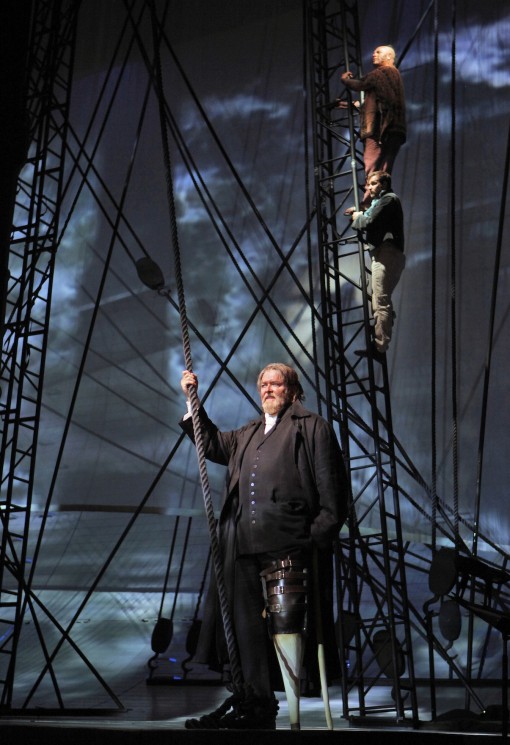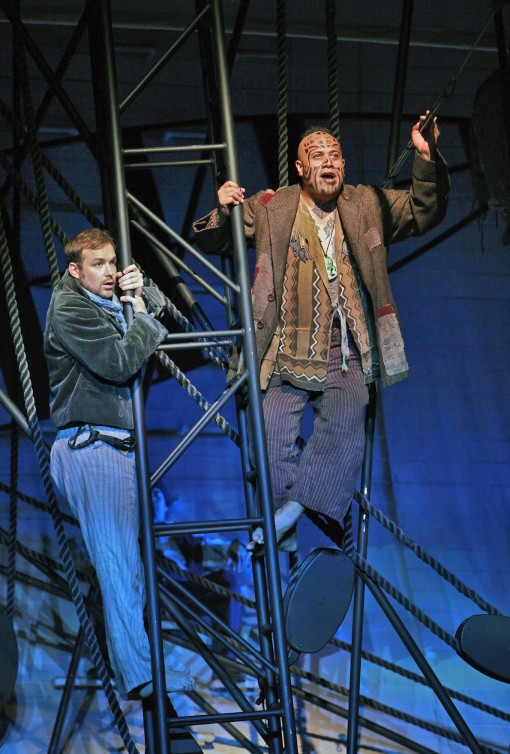Heggie’s richly textured “Moby-Dick” scores a triumph at San Francisco Opera

Jay Hunter Morris as Captain Ahab in “”Moby-Dick” at San Francisco Opera. Photo: Cory Weaver
“We are lost in the heart of the sea.”
Those words, coming late in the evening from the sailor Greenhorn get to the essence of Moby-Dick, Jake Heggie’s acclaimed opera, which is currently running at San Francisco Opera in its company debut.
The American composer’s adaptation of Herman Melville’s sprawling 1851 classic has received nearly universal critical acclaim and positive audience reception since its world premiere at Dallas Opera in 2010, and subsequent performances in Australia, Calgary and San Diego.
Thursday night’s performance at War Memorial Opera House amply demonstrated the richness and depth of Moby-Dick, which indeed stands as one of the great American operas of recent decades and is here receiving a triumphant SFO premiere.
Where even in Heggie’s most accomplished previous works such as Dead Man Walking, a certain populist slickness surfaced at times, Moby-Dick is easily his finest achievement to date—indeed here Heggie emerges as our leading young opera composer.
As before his music is largely tonal and accessible but here with richer textures and greater harmonic complexity and sophistication. The dramatic rousing choruses for the Pequod crew rival similar moments in Billy Budd, and Heggie and Scheer have created a wealth of reflective and intimate arias, duets and quartets as well, with nearly every member of the large cast given their moments to shine in the spotlight.
As striking as the vocal richness is, one was unprepared for the scale and ingenuity of Heggie’s orchestral writing. The restless, surging symphonic backdrop is brilliantly scored and deftly avoids the stop-start trap of stand-alone moments of so many contemporary operas. Indeed, the ceaseless flow and momentum of the opera, both musically and dramatically, is one of its most singular qualities.
Not only is the opera by composer Heggie and librettist Scheer an impressive artistic achievement in its own right, it is also a deft and masterful adaptation of Melville’s behemoth novel. Melville’s heaving unkempt brilliance is here distilled into a taut and cohesive two-and-one-half hours with most of the novel’s major motifs—the limits of knowledge, the murky philosophical symbolism, the tension between the Christian and pagan worlds, and the gay subtext (less subtexty here) between Queequeg and Greenhorn enfolded smoothly into the action.
As deserving as Moby-Dick is of its widespread success and popularity, it’s clear that the work also benefits immensely from this justly celebrated staging (a coproduction between several companies including San Francisco Opera). It’s a compelling ride from the very first bars and the swirling projections of stars and rigging that draw us into the music drama to follow. The live action, projections and stage and lighting effects are so artfully fused it is difficult to tell when one element ends and the other begins (as in the eye-popping moment when the crew climbs on the back wall into animated boats, which seem to realistically rock on a projection of the turbulent sea). One can’t praise the production team highly enough from Robert Brill’s evocative sets to Jane Greenwood’s period costumes (and peg leg for Ahab), Gavan Swift’s painterly lighting, Leonard Foglia’s fluent and unobtrusive direction and Elaine McCarthy’s remarkable projections.
Yet for all the stunning visuals, the staging never upstages the music or the singers.
Ben Heppner, who created the role of Captain Ahab in Houston, bowed out of the current production for reasons unspecified. Jay Hunter Morris who made a big hit here (and in New York at the Met) as Siegfried takes on the daunting role with largely successful results.
This is a heldentenor role to be sure and Morris sang with strength, conviction and notably clear enunciation. At times one wanted more power and intensity in some of Ahab’s big moments and the tenor’s gravelly undertone surfaced fitfully, especially early in the evening. But for the most part Morris gave a rounded portrayal of the obsessive captain and one can say that, for this role, the peg leg has been effectively passed from Heppner.
The rest of the cast was virtually faultless.
Morgan Smith was simply terrific as the first mate, Starbuck. Dubious about his increasingly unhinged captain’s obsession with the white whale and looking out for the crew’s interests, Smith brought dramatic authority to the conflicted Christian first mate and sang with a burnished baritone and stern power while also bringing a nostalgic yearning to his moments of homesickness for his wife and family.
As the novel’s omniscient narrator, the character of Greenhorn is here a bit of a cipher, serving in large part to acquaint us with the Pequod captain and crew through the newcomer’s eyes. Still, Stephen Costello brought the right youthful, plaintive timbre to the role, singing quite beautifully not least in his scenes with his close friend, Queequeg.
Jonathan Lemalu proved ideal casting for the role of the noble “savage.” The beefy Samoan bass-baritone at times displayed a wobbly vibrato but brought great sensitivity to Queequeg’s intimate scenes with Greenhorn.
The only female role in the large cast is that of the cabin boy Pip. Talise Trevigne brought a suitable androgyny and high soprano to the trousers role, gamely hurdling the high-flying writing, including while suspended high over the stage after Pip falls overboard. Like Costello, Smith and Lemalu, Trevigne created her role at the Dallas premiere.
As Flask and Stubb, Matthew O’Neill and Robert Orth made the most of their moments in the spotlight as well as contributing to the large ensembles. Joo Won Kang was effective as the offstage voice of Captain Gardiner, with Carmichael Blankenship and Bradley Kynard as the harpooners Tashtego and Daggoo rounding out the cast. The men of the San Francisco Opera Chorus sang with robust corporate tone and often exhilarating vocalism under Ian Robertson’s direction.
Patrick Summers, who was in the pit for Moby-Dick‘s 2010 debut, showed his clear sympathy and knowledge of this score, as was made manifest throughout the evening from the very first note. Summers, who also led the world premiere of Heggie’s Dead Man Walking here in 2000, drew a fluent, flowing account of Heggie’s varied and resourceful score with no longeurs throughout the nearly three-hour evening. The San Francisco Opera Orchestra played magnificently, investing this restless, roiling music with powerful impact in the storm sequence and dramatic climaxes, and luminous strings and winds in the becalmed lyrical moments.
Moby-Dick runs through November 2. sfopera.com

Stephen Costello as Greenhorn and Jonathan Lemalu as Queequeg in “Moby-Dick.” Photo: Cory Weaver.
Posted Oct 20, 2012 at 4:00 pm by Benjamin
Wonderfully colorful review. Perfect balance of tone and description of the proceedings. You gave us a sense of what we saw and heard. If you believe in opera as a living and vital art form, this is a must see show.
TCR thanks for sharing your reactions and impressions.